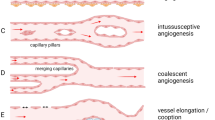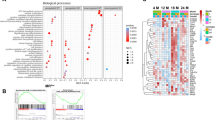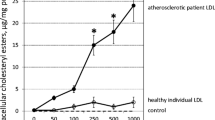Abstract
During the early phase of atherosclerosis, T cells and monocytes attach to and migrate through the endothelium into the vessel wall. To provide an insight into the potential cross talk between T cells and smooth muscle cells (SMC) in atherogenesis, we investigated changes in gene expression caused by CD40 ligation in cultured vascular SMC and their consequences for monocyte activation. CD40 expression in human-cultured SMC was induced by 24-h treatment with tumor necrosis factor-α plus interferon-γ followed by 12-h exposure to mouse myeloma cells stably expressing human CD154 or the corresponding control cells. DNA microarray analysis (Affymetrix HG-U952A chip) indicated 33 up-regulated genes in three individual experiments of which 19 encoded pro-inflammatory adhesion molecules, cytokines, chemokines, and receptors. One functional consequence of this change in gene expression was an activation of transformed human promonocytic-1 monocytes exposed to the conditioned medium of the stimulated SMC. Subsequent antibody neutralization experiments identified granulocyte-macrophage colony-stimulating factor (GM-CSF) as the SMC-derived cytokine responsible for this effect. Thus, vascular SMC-like endothelial cells appear to contribute to the maintenance of an inflammatory response in the atherosclerotic vessel wall upon CD40–CD154 co-stimulation. Among 19 up-regulated pro-inflammatory gene products, GM-CSF plays an important role in SMC-dependent monocyte activation.




Similar content being viewed by others
References
Stary HC, Chandler AB, Glagov S, Guyton JR, Insull W Jr, Rosenfeld ME, Schaffer SA, Schwartz CJ, Wagner WD, Wissler RW (1994) A definition of initial, fatty streak, and intermediate lesions of atherosclerosis. A report from the committee on vascular lesions of the council on arteriosclerosis, American Heart Association. Arterioscler Thromb 14:840–856
Hansson GK, Jonasson L, Lojsthed B, Stemme S, Kocher O, Gabbiani G (1988) Localization of T lymphocytes and macrophages in fibrous and complicated human atherosclerotic plaques. Atherosclerosis 72:135–141
Mach F, Schönbeck U, Sukhova GK, Bourcier T, Bonnefoy JY, Pober JS, Libby P (1997) Functional CD40 ligand is expressed on human vascular endothelial cells, smooth muscle cells, and macrophages: implications for CD40–CD154 ligand signalling in atherosclerosis. Proc Natl Acad Sci USA 94:1931–1936
Reul RM, Fang JC, Denton MD, Geehan C, Long C, Mitchell RN, Ganz P, Briscoe DM (1997) CD40 and CD40 ligand (CD154) are coexpressed on microvessels in vivo in human cardiac allograft rejection. Transplantation 64:1765–1774
Danese S, Katz JA, Saibeni S, Papa A, Gasbarrini A, Vecchi M, Fiocchi C (2003) Activated platelets are the source of elevated levels of soluble CD40 ligand in the circulation of inflammatory bowel disease patients. Gut 52:1435–1441
Wagner AH, Gebauer M, Pollok-Kopp B, Hecker M (2002) Cytokine-inducible CD40 expression in human endothelial cells is mediated by interferon regulatory factor-1. Blood 99:520–525
Krzesz R, Wagner AH, Cattaruzza M, Hecker M (1999) Cytokine-inducible CD40 gene expression in vascular smooth muscle cells is mediated by nuclear factor κB and signal transducer and activation of transcription-1. FEBS Lett 453:191–196
Hollenbaugh D, Mischel-Petty N, Edwards CP, Simon JC, Denfeld RW, Kiener PA, Aruffo A (1995) Expression of functional CD40 by vascular endothelial cells. J Exp Med 182:33–40
Thienel U, Loike J, Yellin MJ (1999) CD154 (CD40L) induces human endothelial cell chemokine production and migration of leukocyte subsets. Cell Immunol 198:87–95
Henn V, Slupsky JR, Grafe M, Anagnostopoulos I, Förster R, Müller-Berghaus G, Kroczek RA (1998) CD40 ligand on activated platelets triggers an inflammatory reaction of endothelial cells. Nature 391:591–594
Lienenlüke B, Germann T, Kroczek RA, Hecker M (2000) CD154 stimulation of interleukin-12 synthesis in human endothelial cells. Eur J Immunol 30:2864–2870
Schönbeck U, Libby P (2001) The CD40/CD154 receptor/ligand dyad. Cell Mol Life Sci 58:4–43
Cattaruzza M, Wachter R, Wagner AH, Hecker M (2000) Modulation by dihydropyridine-type calcium channel antagonists of cytokine-inducible gene expression in vascular smooth muscle cells. Br J Pharmacol 129:1155–1162
Wagner AH, Güldenzoph B, Lienenlüke B, Hecker M (2004) CD154/CD40-mediated expression of CD154 in endothelial cells: consequences for endothelial cell–monocyte interaction. Arterioscler Thromb Vasc Biol 24:715–720
Schönbeck U, Libby P (2001) CD40 signaling and plaque instability. Circ Res 89:1092–1103
Szabolcs MJ, Cannon PJ, Thienel U, Chen R, Michler RE, Chess L, Yellin MJ (2000) Analysis of CD154 and CD40 expression in native coronary atherosclerosis and transplant associated coronary artery disease. Virchows Arch 437:149–159
Mach F, Schönbeck U, Fabunmi RP, Murphy C, Atkinson E, Bonnefoy JY, Graber P, Libby P (1999) T lymphocytes induce endothelial cell matrix metalloproteinase expression by a CD40L-dependent mechanism: implications for tubule formation. Am J Pathol 154:229–238
Aicher A, Shu GL, Magaletti D, Mulvania T, Pezzutto A, Craxton A, Clark EA (1999) Differential role for p38 mitogen-activated protein kinase in regulating CD40-induced gene expression in dendritic cells and B cells. J Immunol 163:5786–5795
Reunanen N, Li SP, Ahonen M, Foschi M, Han J, Kahari VM (2002) Activation of p38 alpha MAPK enhances collagenase-1 (matrix metalloproteinase (MMP)-1) and stromelysin-1 (MMP-3) expression by mRNA stabilization. J Biol Chem 277:32360–32368
Chaudhuri JD (2005) Genes array out for you: the amazing world of microarrays. Med Sci Monit 11:52–62
Chen XL, Tummala PE, Olliff L, Medford RM (1997) E-selectin gene expression in vascular smooth muscle cells. Evidence for a tissue-specific repressor protein. Circ Res 80:305–311
Bernasconi S, Matteucci C, Sironi M, Conni M, Colotta F, Mosca M, Colombo N, Bonazzi C, Landoni F, Corbetta G (1995) Effects of granulocyte-monocyte colony-stimulating factor (GM-CSF) on expression of adhesion molecules and production of cytokines in blood monocytes and ovarian cancer-associated macrophages. Int J Cancer 60:300–307
Saikh KU, Khan AS, Kissner T, Ulrich RG (2001) IL-15-induced conversion of monocytes to mature dendritic cells. Clin Exp Immunol 126:447–455
Plenz G, Koenig C, Severs NJ, Robenek H (1997) Smooth muscle cells express granulocyte-macrophage colony-stimulating factor in the undiseased and atherosclerotic human coronary artery. Arterioscler Thromb Vasc Biol 17:2489–2499
Filonzi EL, Zoellner H, Stanton H, Hamilton JA (1993) Cytokine regulation of granulocyte-macrophage colony stimulating factor and macrophage colony-stimulating factor production in human arterial smooth muscle cells. Atherosclerosis 99:241–252
Acknowledgements
This work was supported by the Deutsche Forschungsgemeinschaft (SFB 405/B17). The expert technical assistance of Annette Benemann and Simone Pöschel is gratefully acknowledged.
Author information
Authors and Affiliations
Corresponding author
Additional information
Milica Stojakovic and Robert Krzesz contributed equally to this work.
Electronic supplementary material
Below is the link to the electronic supplementary material.
Supplementary Table 1
Primer sequences and PCR conditions. Asterisk real-time PCR primers). CCR7 Chemokine CC motif receptor 7, GAPDH glyceraldehyde-3-phophate dehydrogenase, MIP-2β macrophage inflammatory protein-2β, IL-1β interleukin-1β, MCP-1 monocyte chemoattractant protein 1, MMP-3 metalloproteinase 3, RPL32 ribosomal protein L32, VCAM-1 vascular cell adhesion molecule-1. Primer pairs used were specific for the human variant of the listed genes (PDF 85 kb).
Rights and permissions
About this article
Cite this article
Stojakovic, M., Krzesz, R., Wagner, A.H. et al. CD154-stimulated GM-CSF release by vascular smooth muscle cells elicits monocyte activation—role in atherogenesis. J Mol Med 85, 1229–1238 (2007). https://doi.org/10.1007/s00109-007-0225-y
Received:
Revised:
Accepted:
Published:
Issue Date:
DOI: https://doi.org/10.1007/s00109-007-0225-y




